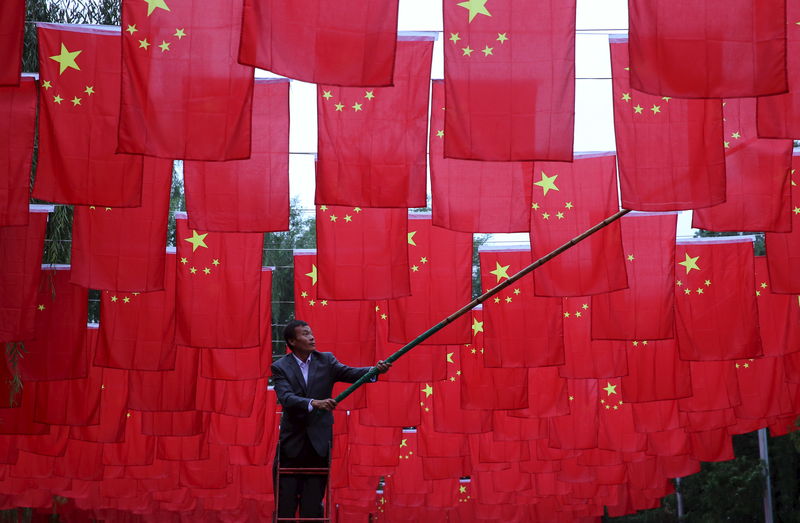(Bloomberg) -- Japan is finally stepping into the ring for a fight it had managed to dodge for more than two years: Bilateral trade talks with U.S. President Donald Trump.
The world’s third-biggest economy has a lot at stake in the talks, which are expected to start next week in Washington just as the U.S.’s negotiations with China appear to be winding down. Prime Minister Shinzo Abe is desperate to avoid tariffs or quotas on lucrative auto exports, while Trump wants to crack open Japan’s agricultural market and reduce a $60 billion trade deficit.
Abe has poured energy into courting Trump to maintain a strategic relationship that secures his country against potential threats from North Korea and China. But that doesn’t mean Japan will roll over on trade: Abe’s government is determined to avoid giving the U.S. a better two-way deal than the multilateral pacts he’s negotiated with Europe and Pacific Rim nations.
“It’s the U.S. who asked for these bilateral negotiations,” said Ichiro Fujisaki, a former Japanese ambassador to the U.S., who’s now president of the Nakasone Peace Institute. “So, it’s the U.S. who should put to us what they want, rather than us offering this and that before being asked.”
The talks add to worries among investors as Trump turns his gaze from China to trade grudges elsewhere. The U.S. leader, who will be judged on his success in rebalancing America’s trade relationships in next year’s presidential campaign, has signaled a willingness to continue market-disrupting tariff threats despite growing economic concerns.
Abe only agreed to bilateral talks after Trump hit Japan’s steel and aluminum exports with punitive tariffs last year and later threatened to impose levies of as much as 25 percent on all imported cars, including those made in Japan. Trump faces a decision in May on how to proceed with the auto tariffs, although White House officials have been telling their European counterparts a delay is likely.
“Japan is now negotiating,” Trump told reporters last month. “They haven’t wanted to negotiate for many years, but now they’re negotiating. It’s called ‘tariffs.’ Tariffs are a very, very great way of getting people to the table.”
Still, Abe’s economy minister, Toshimitsu Motegi, has been able to observe the Trump administration’s previous battles with South Korea, Canada, Mexico and China before sitting down next week with U.S. Trade Representative Robert Lighthizer. In each fight, the U.S. adopted extreme positions that threatened to upend economic ties only to drift toward more modest changes.
Abe has also fortified Japan’s position by sealing trade pacts with the European Union and 10 fellow other partners jilted by Trump when he abandoned the Trans-Pacific Partnership shortly after taking office. Those deals have left U.S. farmers, including beef and pork producers, at risk of losing their 22 percent share of Japan’s food import market to rivals with lower tariffs.
“For Japan, the government has no reason to hasten, to quickly wrap up the negotiations,” said Junji Nakagawa, a professor who researches trade issues at Chuogakuin University in Chiba prefecture near Tokyo. “The impetus for wrapping up negotiations quickly comes from the U.S. side, especially agricultural lobbyists.”
The scope of talks will be key. If the U.S. can accept parity with Europe and TPP nations on agriculture -- as the two sides suggested in a Sept. 26 joint statement -- Abe might settle quickly. Trump is expected to visit Tokyo next month for a state visit with the incoming emperor, Crown Prince Naruhito, and Japan doesn’t want trade disputes marring the pageantry.
“Abe will want to do anything that smooths the way for Trump’s visit,” said Daniel Sneider, a lecturer in international policy at Stanford University.
Problem is, the same joint statement also called for reducing Japan’s trade surplus -- and agriculture parity may not be enough for Trump. Abe could dig in to avoid a one-sided deal, especially with his ruling Liberal Democratic Party facing an upper house election in July.
Japan, which continues to hold out hope for the U.S.’s return to the TPP, could insist on the market access it received under that pact. That means the elimination of tariffs on the country’s auto parts, which comprised 6 percent of its exports to the U.S.
One scenario hinted at in last year’s joint statement is a swift agreement on easier issues, followed by a second round of talks on a more complete deal. That would give Trump a win and allow Abe to focus on a rare series of historic events, including Emperor Akihito’s planned April 30 abdication and the Group of 20 summit in Osaka.
With Abe set to pay his own visit to the U.S. in late April, he could also try to cobble together investment pledges from the Japanese auto sector that would bolster U.S. employment, and help fend off tariffs.
“I suspect that Japanese car makers and the government are communicating very closely on what type of gifts they can deliver in parallel with the bilateral government negotiations,” said Nakagawa, of Chuogakuin University.
